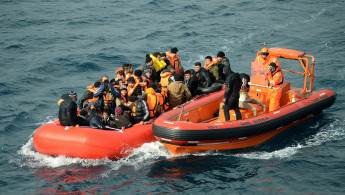Migrant Mediterranean crossings '10 times higher than last year'
At least 409 people have died so far this year trying to cross the Mediterranean Sea, as migrant crossings in the first six weeks of 2016 reach nearly ten times the rate of the same period last year.
Despite harsh wintry conditions, thousands of people fleeing war and poverty in the Middle East, Asia and Africa, continue to make the treacherous sea journey to Europe, many paying with their lives.
The International Organization for Migration says 76,000 people have reached Europe by sea, nearly 2,000 per day, since January.
More than three-fourths of the deaths have been on the short eastern Mediterranean route between Turkey and Greece – which traditionally has seen far fewer deaths than the much longer central Mediterranean route between Libya and Italy.
The IOM statement comes a day after Turkey's coast guard said 27 migrants had died after their boat capsized in the Bay of Edremit while trying to reach the Greek island of Lesbos.
Earlier this month, the Turkish coastguard recovered the bodies of nine people, including two babies, after their boat sank just a short distance from land while trying to reach Europe.
The harrowing scenes were reminiscent of the death of Aylan Kurdi, the Syrian toddler whose tiny body was found lying face down on a Turkish beach in September last year.
 |
The International Organization for Migration says 76,000 people have reached Europe by sea, nearly 2,000 per day, since January |  |
The European Union is now urging states to speed up refugee relocation.
 |
|
| The EU is urging states to speed up refugee relocation [Getty] |
EU migration commissioner Dimitris Avramopoulos said on Wednesday he has written letters to member states with a "clear and strong message" to accelerate the relocation of refugees from overstretched Greece and Italy.
Avramopoulos told a press conference he had sent letters to all the interior ministers of the 28-nation bloc after only 497 people were relocated to other member states out of the 160,000 agreed last September.
"That is why I have addressed a letter today to each interior minister with a clear and strong message to remind them that they are bound by the relocation decisions which have to be implemented immediately in light of the emergency of the situation," Avramopoulos said.
"We need urgently to switch gears on relocation," he added.
"The results are very poor. So right now we have to step up our efforts for all member states to do their part."
The European Commission also said it had proposed suspending a third of the relocations that Austria is meant to take in a bid to take pressure off Vienna.
As president of the commission, the EU executive, Jean-Claude Juncker has championed the relocation scheme, vowing last month "not to give up" on it despite its slow progress.
European sources interviewed have blamed the delays on a series of factors: governments trying to screen extremists in the wake of the Paris attacks, a lack of housing and education for asylum seekers, and logistical problems over chartering planes.
They say some countries are setting unacceptable conditions by refusing Muslims, black people or large families, with Eastern European states the worst for discriminating on religious or racial grounds.


![President Pezeshkian has denounced Israel's attacks on Lebanon [Getty]](/sites/default/files/styles/image_684x385/public/2173482924.jpeg?h=a5f2f23a&itok=q3evVtko)



 Follow the Middle East's top stories in English at The New Arab on Google News
Follow the Middle East's top stories in English at The New Arab on Google News


